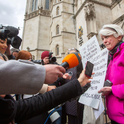Britain's libel laws are unfair. Intended to protect the individual, they are routinely used by large corporations to discourage their critics. Confronted with the best QCs money can buy and the prospect of ruinous costs and damages, the defendants almost always back down, whether or not they believe their cause to be just. The result is that a significant arena of public life has been placed beyond the bounds of free speech.
A few courageous souls with little to lose have withstood the corporate assault and allowed their cases to proceed to court. Today the undisputed heroes of free speech are the "McLibel Two," the unemployed pair who defended themselves against McDonald's and won a famous partial victory. They could soon be joined by another plucky crusader, a small but tenacious magazine called Living Marxism, or LM.
In 1997, LM published an article entitled "The picture that fooled the world," claiming that ITN had fabricated its discovery in 1992 of emaciated Muslim prisoners held in camps by the Bosnian Serbs. The article claimed that ITN's footage showed not a detention centre, as ITN maintained, but a safe haven for refugees. The Bosnian Serb soldiers at the camp were not detaining the Muslims, but defending them.
ITN instituted proceedings for libel. The corporation insisted that it had no choice but to defend its journalists' reputations. LM argued that ITN had plenty of opportunities to defend itself, without resorting to the courts. Some of the world's leading liberals leapt to the magazine's defence: Harold Evans, Doris Lessing, Paul Theroux, Fay Weldon and others condemned ITN's "deplorable attack on press freedom." The ICA, home of progressive liberalism, co-hosted a conference with the magazine called Free Speech Wars. So, puny iconoclastic David goes to war (the case comes to court next month) with the clanking orthodoxies of multinational Goliath.
This, at least, is how LM would like its struggle to be seen. But there is more to this David than meets the eye. The magazine was launched in 1988 as an outlet for the Revolutionary Communist Party, a sect which split from the International Socialists in the 1970s. Soon the RCP was collapsed into Living Marxism, which later changed its name to LM. Its mission, the editors announced, was to promote human freedom based on a "confident individualism." There should be no limits to human action, least of all those imposed by "official and semi-official agencies... from the police and the courts to social services, counsellors and censors."
LM would not hesitate to present uncomfortable truths to power. In this spirit, in February 1997 it recruited the investigative journalist Thomas Deichmann to tell the real story behind the Bosnian enclosures. Only it wasn't quite like that. Deichmann was an engineer by training, not a journalist. His writing was largely confined to an obscure German magazine called Novo, which he used repeatedly to defend the Bosnian Serb leadership against charges of murder, torture, rape and ethnic cleansing. He presented himself as a witness for the defence at the trial of the Serbian war criminal Dusko Tadic.
LM's contributors do seem to have extraordinary contacts. Last year, Channel 4 devoted its Sunday night peak slot to a series called Against Nature. By seeking to impose limits on progress, the series alleged, environmentalists are the true heirs of the Nazis.
The director of Against Nature, Martin Durkin, and the assistant producer, Eve Kay, were both stalwarts of the RCP/LM. The series starred Frank Furedi, LM's regular columnist and most influential thinker (known as Frank Richards in his RCP days), and John Gillott, LM's science editor, both billed as independent experts. Line by line, point by point, Against Nature followed the agenda laid down by LM: that greens are not radicals, but doom-mongering imperialists; that global warming is nothing to worry about; that "sustainable development" is a conspiracy against people; while gene therapy and human cloning will liberate humanity from nature. The Independent Television Commission, reviewing Against Nature in response to thousands of complaints, handed down one of the most damning rulings it has ever made.
Strange Marxists these, who offer such solace to capital. Joan Phillips, who is director of LM's sister organisation, the London International Research Exchange, and helps Deichmann to explain away Serb atrocities in the pages of LM, works under the name of Joan Hoey as one of the Economist Intelligence Unit's Balkans analysts. Frank Furedi offers his services to the Food and Drink Federation, proposing to "educate" consumers towards a "less emotive" consideration of food safety.
Even Marxists have to engage with global capital to make a living, but this doesn't explain the next mystery: LM's association with overtly right-wing organisations. The March 1998 edition ran a substantial article by Ron Arnold, claiming that the Unabomber is an environmentalist, ergo all environmentalists are terrorists. Ron Arnold is executive vice president of the Center for the Defense of Free Enterprise, one of the wackiest far-right groups in the US. In the Against Nature series, LM's contributors also rubbed shoulders with Larry Craig, a far-right Republican senator and fundraiser for the raving "Alliance for America"; Julian Simon, who was Ronald Reagan's favourite economist; and Michael Gough, who, like Simon, belongs to a right-wing libertarian think-tank called the Cato Institute. All maintained an identical political position, lining up to identify the liberals and lefties of the environmental movement as covert Nazis.
In one issue after another, there is a staggering congruence between LM's agenda and that of the far-right Libertarian Alliance. The two organisations take identical positions: for example, on gun control (it is a misconceived attack on human liberty); child pornography (legal restraint is an excuse for the wider censorship of the internet); alcohol (its dangers have been exaggerated by the new "puritans"); the British National Party (it's unfair to associate it with the murder of Stephen Lawrence; its activities should not be restricted); tribal people (celebrating their lives offends humanity's potential to better itself); animal rights (they don't exist); and global warming (it's a good thing).
The two organisations share a strangely one-sided conception of freedom, celebrating and defending the "freedom to" of those with the power to act, while dismissing threats to the "freedom from" of those who might be affected. Thus, limiting the scope of racist publications insults our humanity, even though they might incite racists to beat up black people; and restricting car use is a fundamental assault on liberty, even though being hit by cars is now the most common cause of death for children between the ages of one and 14.
Both organisations also appear to believe that the weak and vulnerable are best served by being allowed to fend for themselves, without interference from "do-gooders." Left to their own devices, both adults and children are capable of resisting alcopops, paedophiles and pornographers, whatever the imbalance in power may be. Corporations, LM appears to suggest, should be free to do whatever they want-except suing LM.
But the similarities end with the ideology. While the Libertarian Alliance is a shabby, disaggregated outfit, LM is professional and well-organised. The magazine is glossy, well-written and cleverly edited; it is distributed largely for free and carries no adverts, yet it seems to have no shortage of money.
So who is this strangely armoured David? Where do his politics come from? Can LM's editors really be such deranged fundamentalists that they are seeking to hasten the triumph of capitalism, the better to speed its downfall? Or are they trying to destroy alternative outlets for radical action, in the hope that the revolution, when it comes, will be untainted by heresy? Perhaps they have simply taken what liberals consider to be the rather short journey from extreme left to extreme right.
Had the magazine been named "Living Libertarianism" or "Living Reaganism," I wonder how willing the liberal establishment would have been to leap to its defence. Oppressive as ITN's suit might be, LM's survival is no great liberal cause. For its new-found champions on the liberal left can be assured of just one thing: that of all political classes, LM hates them the most.











